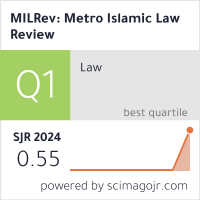Gender Justice in Child Custody Disputes: The Maqāṣid al-Sharī‘ah Approach in Contemporary Judicial Practice
DOI:
https://doi.org/10.32332/milrev.v4i2.10790Keywords:
Gender Justice, Child Custody, Maqāṣid al-Sharī‘ah, Contemporary Judicial PracticeAbstract
Child custody disputes (ḥaḍānah) after divorce are a key issue in discussions of gender justice in Islamic family law, especially in Muslim-majority countries, including Indonesia. In this context, this study examines sixteen child custody decisions issued by religious courts in the Banten region, examining how the principles of maqāṣid al-sharī‘ah are applied in legal deliberations and the extent to which these decisions reflect the principles of gender justice and the best interests of the child. Using an integrated socio-legal approach and content analysis, this study examines the construction of legal reasoning from the decisions' content and the surrounding social context. Research findings indicate a shift in the legal reasoning of some judges towards a more substantive and contextual approach, taking into account the emotional, psychological, and social dimensions of children within the framework of hifẓ an-nafs and hifẓ annNasl. However, gender bias remains, including a tendency to place a higher burden of proof on mothers than fathers, and the influence of economic factors, which often outweigh the emotional well-being of the child. This study highlights the essence of incorporating the maqāṣid al-sharīʻah paradigm into judicial practice to ensure fair, responsive, and child-centered decisions. In addition to making a conceptual contribution to the reform of Islamic family law grounded in maqāṣid values, this study also recommends applying more appropriate jurisprudential guidelines to judges in adjudicating haḍānah cases, thereby consistently upholding the principles of substantive justice and gender equality.
Downloads
References
Abdullah, Abdullah, Akhmad Syahri, Fatin Hamamah, Abd. Gafur, and Ahmad Sholeh. "Fulfillment of The Living Rights of Children the Victims of Divorce in the Muslim Community of Lombok, Indonesia." El-Usrah: Jurnal Hukum Keluarga 7, no. 1 (2024): 253–271. https://doi.org/10.22373/ujhk.v7i1.22281.
Abidin, Muhammad Amin Al-Syahir Ibnu. “Peranan Hakim Dalam Pencegahan Perkawinan Di Usia Anak Dan Perlindungan Kepentingan Terbaik Bagi Anak Terkait Pengajuan Perkara Dispensasi Kawin Di Pengadilan Agama Pangkalan Balai.” Jurnal Hukum Doctrinal 8, no. 1 (2023). https://jurnal.um-palembang.ac.id/doktrinal/article/view/6159.
Ahmad, Afrizal. “Reformulasi Konsep Maqashid Syar’iah; Memahami Kembali Tujuan Syari’at Islam Dengan Pendekatan Psikologi.” Hukum Islam 14, no. 1 (2014). http://dx.doi.org/10.24014/hi.v14i1.988.
Al-Shāṭibī. Al-Muwāfaqāt Fī Uṣūl al-Sharī‘ah. Dār al-Kutub al-‘Ilmiyyah, 2003.
Auda, Jasser. Maqasid Al-Shariah as Philosophy of Islamic Law: A Systems Approach. The International Institut of Islamic Thougth, 2007.
Auda, Jasser. Membumikan Hukum Islam. Mizan, 2015.
Aulia, Nuansa. Kompilasi Hukum Islam. Citra Umbara, 2017.
Badilag Mahkamah Agung RI. “Diserahkan Secara Sukarela, Eksekusi Hak Asuh Anak Berakhir Damai Di PA Serang.” Berita Badilag, June 29, 2021. https://badilag.mahkamahagung.go.id/seputar-peradilan-agama/berita-daerah/diserahkan-secara-sukarela-eksekusi-hak-asuh-anak-berakhir-damai.
Barlas, Asma. Believing Women in Islam: Unreading Patriarchal Interpretations of the Qur'an. University of Texas Press, 2002. https://www.amazon.com/Believing-Women-Islam-Patriarchal-Interpretations/dp/0292709048.
Creswell, John W. Research Design: Qualitative, Quantitative, and Mixed Methods Approaches. SAGE Publications, 2014. https://books.google.co.id/books/about/Research_Design.html?hl=id&id=4uB76IC_pOQC&redir_esc=y.
Fajar ND, Mukti, and Yulianto Achmad. Dualisme Penelitian Hukum Normatif Dan Empiris. Pustaka Pelajar, 2010.
Fitriyani, Fitriyani, Asep Saepuddin Jahar, Zaitunah Subhan, and Rosdiana Rosdiana. "The Judges' Legal Consideration on Divorce of Nushūz Cases at the Kupang High Religious Court: Gender Perspective." Samarah: Jurnal Hukum Keluarga Dan Hukum Islam 7, no. 3 (2023): 1971. https://doi.org/10.22373/sjhk.v7i3.14425.
Fraser, Nancy. Justice Interruptus. 0 ed. Routledge, 2014. https://doi.org/10.4324/9781315822174.
Gadamer, Hans-Georg. Truth and Method. Sheed & Ward, 1975. https://books.google.co.id/books?id=96qIQAAACAAJ.
Huda, Miftahul, and Tri Wahyu Hidayati. "The Concept of Muḥammad Shaḥrūr on Gender Parity in Inheritance Legislation." El-Usrah: Jurnal Hukum Keluarga 6, no. 2 (2023): 262. https://doi.org/10.22373/ujhk.v6i2.18121.
Jamal, R., and R. Bukido. “Pertimbangan Perkara Pemeliharaan Anak Di Pengadilan Agama Manado.” Al-Istinbath: Jurnal Hukum Islam 6, no. 2 (2021): 205–222. Scopus. https://doi.org/10.29240/jhi.v6i2.2453.
Jumardin, Rusdaya Basri, and Aris. “Analisis Yuridis Tentang Hak Asuh Anak (Hadhanah) Dan Penerapannya Di Pengadilan Agama Barru.” Hukamaa: Jurnal Hukum Keluarga Islam 2, no. 2 (2024). https://doi.org/10.35905/hukamaa.v2i2.11507.
Kamali, Mohammad Hashim. Shari'ah Law: An Introduction. Oneworld Publications, 2008. https://oneworld-publications.com/work/shariah-law/.
Kelly, Joan B. "The Determination of Child Custody." The Future of Children 4, no. 1 (1994): 121. https://doi.org/10.2307/1602481.
Khairunnisa, Ds. “Disparitas Putusan Hakim Terhadap Hadhanah Bagi Anak Yang Belum Mumayyiz Perspektif Maslahah Mursalah (Studi Putusan Pengadilan Agama Nomor 368/Pdt.G/2022/Pa.Pdg. Dan Putusan Pengadilan Agama Nomor 74/Pdt.G/2023/Pa.Tas).” Bachelor thesis, UIN Syarif Hidayatullah, 2024. https://repository.uinjkt.ac.id/dspace/handle/123456789/76166?mode=full.
Laitinen, Arto. "Misrecognition, Misrecognition, and Fallibility." Res Publica 18, no. 1 (2012): 25–38. https://doi.org/10.1007/s11158-012-9183-5.
Mahaseth, H., and S. Khatoon. "Jordan’s Child Custody Law: A Blueprint for Progress.” Manchester Journal of Transnational Islamic Law and Practice 21, no. 1 (2025): 355–359. Scopus.
Maliki, Ibnu Akbar, Nurhidayati Nurhidayati, and Mardan Erwinsyah. “Pengasuhan Dan Perlindungan Anak Dalam Undang-Undang Negara Muslim (Meninjau Resiprokalitas Keluarga Dan Negara).” Syakhshiyyah Jurnal Hukum Keluarga Islam 3, no. 1 (2023): 14. https://doi.org/10.32332/syakhshiyyah.v3i1.7028.
Mera, N., M. Taufan, B. Sapruddin, and A.I. Cahyani. “Child Custody Rights for Mothers of Different Religions: Maqāṣid al-Sharī’ah Perspective on Islamic Family Law in Indonesia.” Samarah 8, no. 3 (2024): 1644–1668. Scopus. https://doi.org/10.22373/sjhk.v8i3.23809.
Mohamad, A.B., R. Machae, and M. Khareng. “Children’s Protection in the Issue of Hadhanah Based on Islamic Family Law and the Law of Thailand.” Asian Social Science 12, no. 10 (2016): 18–26. Scopus. https://doi.org/10.5539/ass.v12n10p18.
Mohd, A., B. Ibrahim, and A.U. Alkali. “An Overview of the Protection of Children Rights under Islamic Law.” Advanced Science Letters 23, no. 4 (2017): 3251–3254. Scopus. https://doi.org/10.1166/asl.2017.7730.
Moleong, Lexy J. Metodologi Penelitian Kualitatif. Remaja Rosdakarya, 2007.
Monateri, Pier Giuseppe. “Form and Substance in Comparative Law and Legal Interpretation.” International Journal for the Semiotics of Law - Revue Internationale de Sémiotique Juridique 37, no. 5 (2024): 1533–1556. https://doi.org/10.1007/s11196-024-10124-4.
Mulia, Musdah. Islam Dan Inspirasi Keadilan Gender. Kibar Pres, 2007.
Musawah. “CEDAW and Muslim Family Laws.” Musawah, 2019. https://www.musawah.org/resources/cedaw-muslim-family-laws/.
Nasution, A. “The Disparity of Judge’s Verdict on Child Custody Decision in Aceh Sharia Court.” Samarah 6, no. 2 (2022): 890–913. Scopus. https://doi.org/10.22373/sjhk.v6i2.12758.
Nazah, Farida Nurun, and Muslimin Muslimin. “The Judges Legal Reasoning on Child Welfare’s Perspective in the Hadanah Cases at Banten Religious Courts.” Jurnal Hukum 40, no. 1 (2024): 14. https://doi.org/10.26532/jh.v40i1.36621.
Othman, Norani. “Muslim Women and the Challenge of Islamic Fundamentalism/Extremism: An Overview of Southeast Asian Muslim Women’s Struggle for Human Rights and Gender Equality.” Women’s Studies International Forum 29, no. 4 (2006): 339–353. https://doi.org/10.1016/j.wsif.2006.05.008.
Purnomo, Agus, Umi Sumbulah, Nor Salam, and Hikam Hulwanullah. “Characteristics of Hate Speech and Freedom of Expression in the Perspective of Maqāṣid Al-Sharī’ah.” JURIS (Jurnal Ilmiah Syariah) 22, no. 1 (2023): 171. https://doi.org/10.31958/juris.v22i1.9446.
Ramadhita, Ramadhita, Mahrus Ali, and Bachri Syabbul. “Gender Inequality and Judicial Discretion in Muslims Divorce of Indonesia.” Cogent Social Sciences 9, no. 1 (2023). https://doi.org/10.1080/23311886.2023.2206347.
Reimann, Maria. “‘Everybody Likes It More When It’s Even’: Joint Physical Custody from the Children’s Perspective.” Intersections 9, no. 3 (2023): 188–201. https://doi.org/10.17356/ieejsp.v9i3.1120.
Saini, S. “Rekonstruksi Hukum Hak Asuh Anak Perspektif Maqāṣid Syarī’ah Dalam Hukum Keluarga Islam.” Journal of Innovative and Creativity 5, no. 2 (2025). https://doi.org/10.31004/joecy.v5i2.1465.
Salin, Milla, Daniel R. Meyer, Mia Hakovirta, and Eija Lindroos. “Factors Associated with the Joint Physical Custody of European Children.” Population Research and Policy Review 43, no. 4 (2024). https://doi.org/10.1007/s11113-024-09909-z.
Santoso, D., L. Shesa, M. Asmara, S.A.A. Usmani, and A. Syarifudin. “The Understanding of the Jamaah Tabligh on Wife Gender Justice: A Maqāṣid Sharīʿa Review.” Juris: Jurnal Ilmiah Syariah 21, no. 2 (2022): 183–194. Scopus. https://doi.org/10.31958/juris.v21i2.6935.
Shao, Hsuan-Lei, Robert B Leflar, and Sieh-Chuen Huang. “Factors Determining Child Custody in Taiwan after Patriarchy’s Decline: Decision Tree Analysis on Family Court Decisions.” Asian Journal of Comparative Law 18, no. 2 (2023): 272–288. https://doi.org/10.1017/asjcl.2022.28.
Supriyadi, and Nik Abdul Rahim Nik Abdul Ghani. “Negotiating Tradition and Modernity: The Practice of Prohibiting Marriage in the Month of Suro among Javanese Muslims in South Lampung.” NUSANTARA: Journal Of Law Studies 4, no. 2 (2025): 114–128. https://doi.org/10.5281/zenodo.17340470.
Ulfiana, Ana, Indah Listyorini, and Muhamamd Yasir Majeed. “Judges’ Considerations In Divorce Cases Due To Broken Marriage: An Analysis Of Contemporary Islamic Family Law.” Al-Mawarid Jurnal Syariah Dan Hukum (JSYH) 7, no. 1 (2025): 135–152. https://doi.org/10.20885/mawarid.vol7.iss1.art8.
UNICEF. “The State of the World’s Children 2021.” UNICEF, 2021. https://www.unicef.org/reports/state-worlds-children-2021.
Wadud, Amina. Inside the Gender Jihad: Women’s Reform in Islam. Oneworld Publications, 2006. https://www.amazon.com/Inside-Gender-Jihad-Womens-Reform/dp/1851684638.
Warshak, Richard A. “Gender Bias In Child Custody Decisions.” Family Court Review 34, no. 3 (1996): 396–409. https://doi.org/10.1111/j.174-1617.1996.tb00429.x.
Yuni, Lilik Andar, and Murjani Murjani. “Gender Sensitivity at Judge’s Verdicts in Samarinda and Magelang Religious Courts; The Implementation of PERMA Number 03 of 2017.” AL-IHKAM: Jurnal Hukum & Pranata Sosial 15, no. 2 (2020): 251–279. https://doi.org/10.19105/al-lhkam.v15i2.2714.
Zahraa and Malek. “The Concept Of Custody In Islamic Law.” Arab Law Quarterly 13, no. 2 (1998): 155–177. https://doi.org/10.1163/026805598125826076.
Zhang, Xin, Shi Chen, and Mengyuan Wang. “Gender Bias in Child Custody Judgments: Evidence from Chinese Family Court.” PLOS ONE 19, no. 7 (2024): e0305479. https://doi.org/10.1371/journal.pone.0305479.
Downloads
Published
Issue
Section
License
Copyright (c) 2025 Farida Nurun Nazah, Restia Gustiana, Tobibatus Saadah, Ahmad Suryadi

This work is licensed under a Creative Commons Attribution-ShareAlike 4.0 International License.










